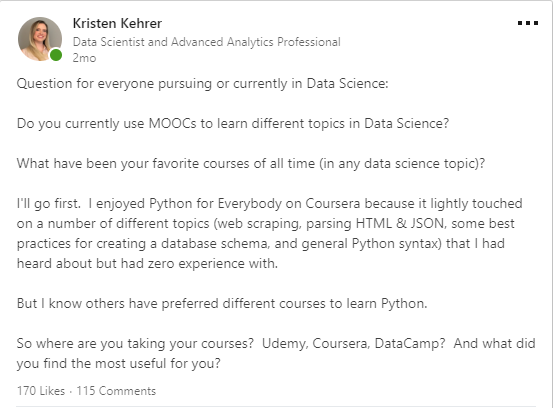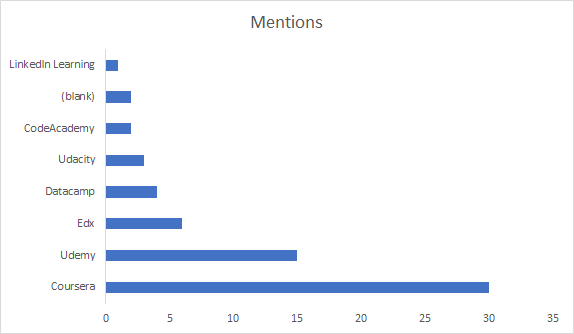Strong Data Science Content for Your Resume
The biggest pain point or challenge I hear when people are writing their resume is that they want concise, crisp, effective content that sounds impactful. But they’re not sure how to write that wonderful content they want.
There is so much to consider when thinking about your content. There are many different traits you want to showcase on your resume that the business values for any given position. There is much more to a successful data science hire than just technical and machine learning ability, and we'll want to think about how to best position these skills as well. Here are some quick examples of how you can up-level the content on your resume to get you started.
Here we’re going to cover:
- Starting with a verb
- Ending with the value you provided
Starting with a verb
Strong statements start with an action verb. A short list of some verbs that you can try to apply to your experience include:
- Built
- Delivered
- Developed
- Increased efficiency
- Created
- Evaluated
- Trained
Try to vary your verbs as well. Don’t use the same one over and over again throughout your resume.
So we have some words, let’s look at some real examples from resumes and how the statements improve by starting with a verb.
This first example comes from a math teacher who is learning data science through MOOCs and is planning to make a career change.
Original: “I ran live lessons on Blackboard Collaborate and attended meetings via the computer.”
Updated: "Presented math training virtually, delivered mathematical concepts in a way that students could easily comprehend and learn."
This shows that she is able to break down material and communicate well. The following would also work:
Updated (another version): "Conducted virtual meetings with expert communication. Provided students the ability to receive one-on-one guidance to keep them on pace in a way that fit their schedule."
The next example is from a BI professional who is also looking to make a move to data science:
Original: “Participation in Global Transformation Program as Commercial Finance Business Intelligence (BI) expert (Credit and Collections), in the definition of KPIs and Global template Reports. Testing, Business Readiness and Post Go live support for Ecuador implementation (Releases 1, 2 and 3). Support to front office area (sales and distribution).”
Here, our example owned the definition of KPIs and reporting. She also contributed cross-functionally to help make this project a success. Talking about ownership of KPIs, and being a strong contributor cross-functionally sounds stronger when we begin with a verb instead of “participation” (noun).
Updated: "Owned definition of KPIs and reporting, ensuring accuracy and allowing for self-service of key metrics by stakeholders."I'd certainly need to create more bullet points to capture all of the information in the original, but this is an idea of what we're trying to achieve.
Ending your statements with the result or value
Let’s look at an opportunity for improvement that was on my resume for a while.
Original: “Built Neural Network models to forecast hourly electric load.”
Cool story, but did I just build it for fun? Or was it useful? Especially in a space where businesses are all too familiar with someone building a fancy model, and then it never gets used for anything, it is of utmost importance that you clearly demonstrate how your work was utilized.
Spell. it. out.
Updated: “Built Neural Network models to forecast hourly electric load. Model output was imperative during extreme weather and was used for capacity planning decisions.”
Now I have a statement that shows not only that I delivered a model, but that model delivered value to the business.
Maybe your previous work experience doesn’t involve building a model. Maybe you built a dashboard. Did that dashboard allow your stakeholders to get valuable information on their own (referred to as self-service)? That’s value. Did the dashboard reduce the amount of time spent on ad-hoc, low value data aggregation so you could focus on higher value initiatives? That’s value, because here you’re increasing efficiency.
Using verbs as your starting point and demonstrating the value your work provided is a great step towards marketing yourself and showcasing your talents. Think deeply about what was the purpose of the work, and spell that out on your resume.
Favorite MOOCs for Data Scientists

I had asked on LinkedIn recently about everyone’s favorite MOOCs in data science. This post started a lot of great discussion around the courses (and course platforms) that people had experience with. Certain courses were mentioned multiple times and were obviously being recommended by the community.Here was the post:Biggest takeaway:
Anything by Kirill Eremenko or Andrew NG were highly regarded and mentioned frequently.

So I decided to revisit this post, and aggregate the information that was being shared so that people who are looking for great courses to build their data science toolkit can use this post as a starting point.You’ll notice that below Coursera had the most mentions, this is mostly driven by Andrew Ng’s Machine learning course (11 mentions for that course alone) and Python For Everybody (6 mentions, also on Coursera). Similarly, Kirill has a number of courses on Udemy that all had multiple mentions, giving Udemy a high number of mentions in the comments as well. (Links to courses are lower in this article).The 2 blanks were due to one specific course. “Statistical Learning in R” it is a Stanford course. Unfortunately I wasn’t able to find it online. Maybe someone can help out by posting where to find the course in the comments?
Update! Tridib Dutta and Sviatoslav Zimine reached out within minutes of this article going live to share the link for the Stanford Course. There was also an Edx course that was recommended that is not currently available, “Learning From Data (Introductory Machine Learning)" so I won’t be linking to that one.
If you’re familiar with MOOCs, a number of platforms allow you to audit the course (i.e. watch the videos and read the materials for free) so definitely check into that option if you’re not worried about getting graded on your quizzes.To make the list, a course had to be recommended by at least 2 people (with the exception of courses covering SQL and foundational math for machine learning, since those didn’t have a lot of mentions, but the topics are pretty critical :).I've organized links to the courses that were mentioned by topic. Descriptions of courses are included when they were conveniently located on the website.
Disclaimer: Some of these links are affiliate links, meaning that at no cost to you, I’ll receive a commission if you buy the course.
SQL:
“Sabermetrics 101: Introduction to Baseball Analytics — Edx”“An introduction to sabermetrics, baseball analytics, data science, the R Language, and SQL.”
“Data Foundations” — Udacity“Start building your data skills today by learning to manipulate, analyze, and visualize data with Excel, SQL, and Tableau.”
Math:
“Mathematics for Machine Learning Specialization” — Coursera“Mathematics for Machine Learning. Learn about the prerequisite mathematics for applications in data science and machine learning.”
Tableau:
“Tableau 10 A-Z: Hands-On Tableau Training for Data Science!” — Udemy (This is a Kirill Eremenko course)
R:
“R Programming” — Coursera “The course covers practical issues in statistical computing which includes programming in R, reading data into R, accessing R packages, writing R functions, debugging, profiling R code, and organizing and commenting R code.”
"R Programming A-Z™: R For Data Science With Real Exercises!" — Udemy (This is a Kirill Eremenko course)"Learn Programming In R And R Studio. Data Analytics, Data Science, Statistical Analysis, Packages, Functions, GGPlot2"
If you're looking for the best R course that has ever existed, read about my favorite R programming course. I wouldn't call it a MOOC, because you have direct access to the instructor through Slack. But if you're serious about learning R, check this out. Link
Python:
“Python for Everybody Specialization” — Coursera“will introduce fundamental programming concepts including data structures, networked application program interfaces, and databases, using the Python programming language.”
Python for Data Science:
“Applied Data Science With Python Specialization” — Coursera
“Python for Data Science” — Edx “Learn to use powerful, open-source, Python tools, including Pandas, Git and Matplotlib, to manipulate, analyze, and visualize complex datasets.”
Machine Learning:
“Machine Learning” — Coursera (This is an Andrew Ng course)
“Machine Learning A-Z™: Hands-On Python & R In Data Science” — Udemy (This is a Kirill Eremenko course)
“Python for Data Science and Machine Learning Bootcamp”— Udemy “Learn how to use NumPy, Pandas, Seaborn , Matplotlib , Plotly , Scikit-Learn , Machine Learning, Tensorflow , and more!”
Deep Learning:
“Deep Learning Specialization” — Coursera (This is an Andrew Ng course)" In five courses, you will learn the foundations of Deep Learning, understand how to build neural networks, and learn how to lead successful machine learning projects. You will learn about Convolutional networks, RNNs, LSTM, Adam, Dropout, BatchNorm, Xavier/He initialization, and more.”No one had anything bad to say about any particular course, however, some people did have preferences in terms of platforms. You can read the original post yourself here.I hope these courses help you widdle down the plethora of options (it’s overwhelming!) and I hope you learn some great new information that you can apply in your career. Happy learning!
Favorite MOOCs for Data Scientists. Data science courses. Data Science resources. Data analysis, data collection, data management, data tracking, data scientist, data science, big data, data design, data analytics, behavior data collection, behavior data, data recovery, data analyst. For more on data science, visit www.datamovesme.com

